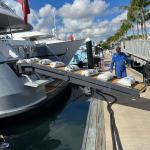The Impact of IACS E26 and E27 Standards on Vessel Insurance
The maritime industry faces increasing cybersecurity threats, prompting the introduction of the IACS E26 and E27 standards by the International Association of Classification Societies (IACS). These standards, set to become mandatory by January 2025, aim to enhance cyber resilience onboard vessels. Their implementation has significant implications for vessel insurance, influencing risk assessment, compliance, and premium calculations.
Risk Reduction
The IACS E26 and E27 standards mandate robust cybersecurity measures, significantly reducing the likelihood of cyber incidents. These measures include comprehensive risk assessments, the implementation of security controls, and continuous monitoring and response plans. By reducing the risk of cyber-attacks, vessels that comply with these standards are less likely to experience physical damage, operational disruptions, or environmental incidents. Insurers recognize this reduced risk and are likely to offer lower premiums to vessels that demonstrate adherence to these cybersecurity standards (DNV.com - When trust matters - DNV).
Compliance and Liability
Demonstrating compliance with the IACS E26 and E27 standards is crucial for vessel owners and operators. In the event of a cyber incident, insurers are more likely to view claims from vessels that have implemented these standards favorably. Compliance shows due diligence in maintaining cybersecurity, which can lead to smoother and more favorable claim settlements. It also helps in mitigating potential liabilities arising from cyber incidents, such as data breaches or operational disruptions (DNV.com - When trust matters - DNV).
Coverage Specificity
Insurers are expected to adjust their policies to reflect compliance with the IACS E26 and E27 standards. For instance, hull and machinery insurance policies might include specific clauses addressing cyber risk management practices. Protection and indemnity (P&I) insurance could also incorporate provisions related to cybersecurity measures, ensuring that vessel owners are covered for liabilities arising from cyber incidents. Cargo insurance policies might similarly be updated to address risks associated with cyber threats (DNV.com - When trust matters - DNV) (American Bureau of Shipping).
Premium Incentives
One of the significant financial incentives for vessel owners to adopt the IACS E26 and E27 standards is the potential for premium discounts. Insurers may offer reduced premiums to vessels that comply with these standards, recognizing the proactive approach to mitigating cyber risks. This financial benefit can serve as a strong motivator for vessel owners to invest in cybersecurity measures and ensure compliance with the standards (American Bureau of Shipping).
Enhanced Coverage Options
The introduction of the IACS E26 and E27 standards is likely to spur the development of new insurance products or enhancements to existing ones. Insurers may offer specialized cyber risk insurance policies tailored to the maritime industry. These policies could provide more comprehensive coverage for cyber incidents, including data breaches, ransomware attacks, and other cyber threats. Enhanced coverage options would better protect vessel owners and operators from the financial impacts of cyber incidents (American Bureau of Shipping) (DNV.com - When trust matters - DNV).
Regulatory Alignment
Insurers will align their requirements with the regulatory framework established by the IACS E26 and E27 standards. This alignment ensures that vessel owners who meet these standards also meet the expectations of their insurers, reducing the potential for coverage disputes or gaps. By adhering to the IACS standards, vessel owners can demonstrate compliance with both regulatory and insurance requirements, providing a more seamless and integrated approach to risk management (American Bureau of Shipping) (DNV.com - When trust matters - DNV).
Conclusion
The implementation of the IACS E26 and E27 standards marks a significant advancement in enhancing cyber resilience within the maritime industry. These standards not only mitigate the risks associated with cyber threats but also have a profound impact on vessel insurance. By reducing risk, ensuring compliance, and potentially lowering premiums, the IACS E26 and E27 standards offer substantial benefits to vessel owners and operators. Moreover, these standards encourage the development of specialized coverage options, contributing to a more secure and resilient maritime sector.




